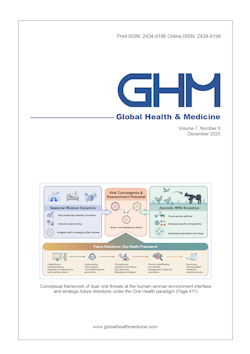Global Health & Medicine 2025;7(3):252-259.
A pilot model of centralized anti-HIV-1 drug resistance testing with decentralized treatment in resource-limited settings
Nguyen TM, Tran GV, Pham TN, Matsumoto S, Nagai M, Tanuma J, Oka S; on behalf of SATREPS project team
Vietnam is a lower-middle-income country where HIV drug resistance (DR) testing is not widely accessible, and antiretroviral therapy (ART) options remain limited. Since 2016, HIV services have gradually transitioned from international donor support to national Social Health Insurance (SHI). Under the decentralized policy of SHI, HIV treatment has been delivered at local neighborhood hospitals, where experience in managing ART failure is still lacking. This study evaluated a pilot model of centralized DR testing combined with decentralized treatment implementation in Northern Vietnam. Seven provincial hospitals and three healthcare facilities participated. Patients' viral loads (VL) were monitored every six months over a 48-month period (October 2019–September 2023). ART failure was defined as VL ≥ 1,000 copies/mL, which triggered DR testing at the National Hospital for Tropical Diseases in Hanoi. Based on DR results, tailored ART recommendations were provided to local hospitals and healthcare settings. The effectiveness of subsequent ART following DR testing was assessed by VL suppression at 90 days or later. Among 179 patients experiencing ART failure, DR testing was successful in 170 cases. DR mutations were detected in 126 patients (74.12%), while 44 (25.88%) showed no mutation. Patients who followed the ART recommendations had a significantly higher VL suppression rate (87.72%) than those who did not (70.37%, p = 0.026). This association was significant in district hospitals (87.50% vs. 60.00%, p = 0.032) but not in provincial hospitals (87.93% vs. 76.47%, p = 0.240). This study highlights the potential clinical benefit of our model in resource-limited situations, particularly where ART management capacity is limited.
DOI: 10.35772/ghm.2025.01045







